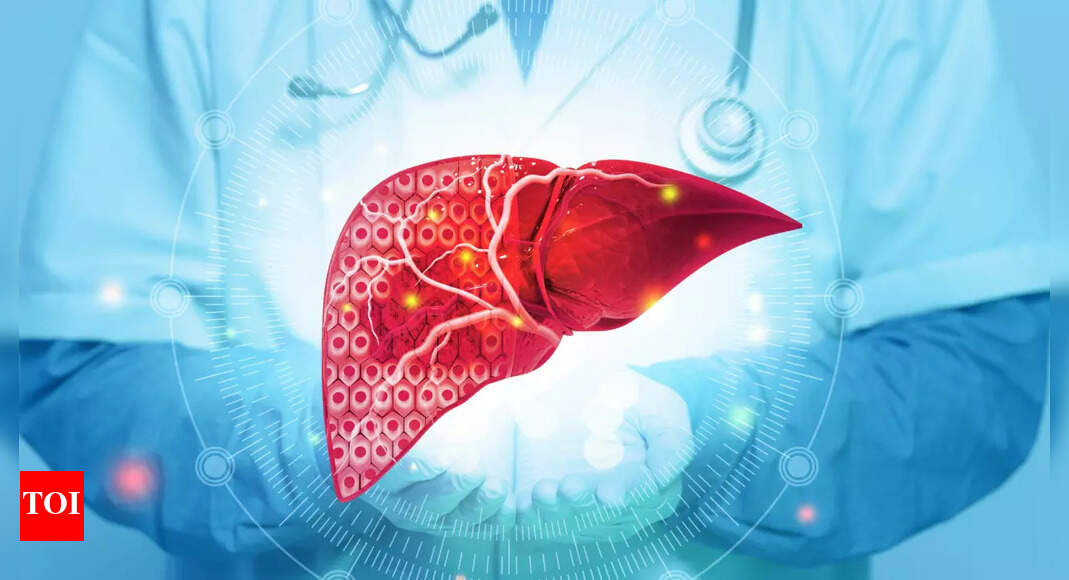3 in 5 liver cancer cases are preventable, experts reveal | – Times of India

In 2020, about 905,700 people were diagnosed with liver cancer, and 830,200 people died from it. It remains the top three causes of death in many countries. With the incidence of liver diseases on the rise, the numbers could further surge. However, a new study has found that most of the liver cancer cases are preventable. According to a new analysis published in The Lancet, 3 in 5 liver cancer cases are preventable. This is more than 60% of liver cancer cases worldwide. 60% of the liver cancer cases are preventable

(Pic courtesy: iStock)
The new study found that three in five liver cancer cases are preventable through the reduction of risk factors, including viral hepatitis, alcohol, and metabolic dysfunction-associated steatotic liver disease (MASLD), a long-term liver condition caused by excess fat in the liver. The study on liver cancer predicts that by 2050, liver cancer cases caused by a severe form of MASLD, known as MASH, will rise by 35%, from 8% to 11%. The authors have emphasized the importance of creating public, medical, and political awareness of the rising risk of MASLD, especially in the USA, Europe, and Asia. People with diabetes and obesity are especially at risk. According to the study, new liver cancer cases are predicted to double in the next 25 years if the cause is not addressed. The Commission also suggested that the risk factors can be reduced in several ways, such as increasing the coverage of the hepatitis B vaccine and public health policies that target obesity and alcohol consumption. Previous analyses have predicted that new liver cancer cases will almost double, from 870,000 in 2022 to 1.52 million by 2050, mainly due to population growth and ageing. The biggest rise is expected in Africa. Deaths from liver cancer are projected to increase from 760,000 in 2022 to 1.37 million by 2050.As liver cancer remains a major cause of death and disability, looking at the risk factors is crucial. It is the sixth most common cancer and the third leading cause of death globally. More than 40% of the global liver cancer cases occur in China, mostly due to relatively high rates of hepatitis B infections in the country. “Liver cancer is a growing health issue around the world. It is one of the most challenging cancers to treat, with five-year survival rates ranging from approximately 5% to 30%. We risk seeing close to a doubling of cases and deaths from liver cancer over the next quarter of a century without urgent action to reverse this trend,” Chair of the Commission, Prof Jian Zhou, Fudan University (China) said in a statement. “As three in five cases of liver cancer are linked to preventable risk factors, mostly viral hepatitis, alcohol and obesity, there is a huge opportunity for countries to target these risk factors, prevent cases of liver cancer and save lives,” first author, Prof Stephen Chan, Chinese University of Hong Kong (Hong Kong, China) added. Shift in the cause of liver cancer
The study stressed that at least 60% of liver cancers are preventable by controlling modifiable risk factors, including hepatitis B virus (HBV), hepatitis C virus HCV, MASLD, and alcohol. The researchers noted that MASLD is a rising risk. Approximately a third of the global population are estimated to have MASLD. However, only 20 to 30% of patients with MASLD develop the more severe form of the condition, with liver inflammation and damage, called metabolic dysfunction-associated steatohepatitis (MASH).The incidence of MASLD-linked liver cancer is expected to go up in the next 10 years, with obesity being the key driver. “Liver cancer was once thought to occur mainly in patients with viral hepatitis or alcohol-related liver disease. However, today rising rates of obesity are an increasing risk factor for liver cancer, primarily due to the increase in cases of excess fat around the liver. One approach to identify patients at high risk of liver cancer would be to introduce screening for liver damage into routine healthcare practice for patients at high risk of MASLD, such as individuals living with obesity, diabetes, and cardiovascular disease. Healthcare professionals should also integrate lifestyle counselling into routine care to support patients to transition to a healthy diet and regular physical activity. Furthermore, policy makers must promote healthy food environments via policies such as sugar taxes and clear labelling on products with high fat, salt, and/or sugar,” commission author, Prof Hashem B El-Serag, Baylor College of Medicine (USA) said.What can be done

According to the commission, if the incidence of liver cancer cases can be reduced by 2 to 5% each year by 2050, it could prevent nine to 17 million cases of liver cancer and save eight to 15 million lives. As more patients live with liver cancer than ever before, in addition to prevention efforts, there is an urgent need for increased research and attention for these patients to improve their quality of life.
“There is an urgent need to raise awareness within society about the severity of the growing health issue of rising liver cancer cases. Compared with other cancers, liver cancer is very hard to treat but has more distinct risk factors, which help define specific prevention strategies. With joint and continuous efforts, we believe many liver cancer cases can be prevented and both the survival and quality of patients with liver cancer will be considerably improved,” Commission author, Prof Valérie Paradis, Beaujon Hospital (France) said.
var _mfq = window._mfq || [];
_mfq.push([“setVariable”, “toi_titan”, window.location.href]);
!(function(f, b, e, v, n, t, s) {
function loadFBEvents(isFBCampaignActive) {
if (!isFBCampaignActive) {
return;
}
(function(f, b, e, v, n, t, s) {
if (f.fbq) return;
n = f.fbq = function() {
n.callMethod ? n.callMethod(…arguments) : n.queue.push(arguments);
};
if (!f._fbq) f._fbq = n;
n.push = n;
n.loaded = !0;
n.version = ‘2.0’;
n.queue = [];
t = b.createElement(e);
t.async = !0;
t.defer = !0;
t.src = v;
s = b.getElementsByTagName(e)[0];
s.parentNode.insertBefore(t, s);
})(f, b, e, ‘https://connect.facebook.net/en_US/fbevents.js’, n, t, s);
fbq(‘init’, ‘593671331875494’);
fbq(‘track’, ‘PageView’);
};
function loadGtagEvents(isGoogleCampaignActive) {
if (!isGoogleCampaignActive) {
return;
}
var id = document.getElementById(‘toi-plus-google-campaign’);
if (id) {
return;
}
(function(f, b, e, v, n, t, s) {
t = b.createElement(e);
t.async = !0;
t.defer = !0;
t.src = v;
t.id = ‘toi-plus-google-campaign’;
s = b.getElementsByTagName(e)[0];
s.parentNode.insertBefore(t, s);
})(f, b, e, ‘https://www.googletagmanager.com/gtag/js?id=AW-877820074’, n, t, s);
};
function loadSurvicateJs(allowedSurvicateSections = []){
const section = window.location.pathname.split(‘/’)[1]
const isHomePageAllowed = window.location.pathname === ‘/’ && allowedSurvicateSections.includes(‘homepage’)
const ifAllowedOnAllPages = allowedSurvicateSections && allowedSurvicateSections.includes(‘all’);
if(allowedSurvicateSections.includes(section) || isHomePageAllowed || ifAllowedOnAllPages){
(function(w) {
function setAttributes() {
var prime_user_status = window.isPrime ? ‘paid’ : ‘free’ ;
var geoLocation = window?.geoinfo?.CountryCode ? window?.geoinfo?.CountryCode : ‘IN’ ;
w._sva.setVisitorTraits({
toi_user_subscription_status : prime_user_status,
toi_user_geolocation : geoLocation
});
}
if (w._sva && w._sva.setVisitorTraits) {
setAttributes();
} else {
w.addEventListener(“SurvicateReady”, setAttributes);
}
var s = document.createElement(‘script’);
s.src=”https://survey.survicate.com/workspaces/0be6ae9845d14a7c8ff08a7a00bd9b21/web_surveys.js”;
s.async = true;
var e = document.getElementsByTagName(‘script’)[0];
e.parentNode.insertBefore(s, e);
})(window);
}
}
window.TimesApps = window.TimesApps || {};
var TimesApps = window.TimesApps;
TimesApps.toiPlusEvents = function(config) {
var isConfigAvailable = “toiplus_site_settings” in f && “isFBCampaignActive” in f.toiplus_site_settings && “isGoogleCampaignActive” in f.toiplus_site_settings;
var isPrimeUser = window.isPrime;
var isPrimeUserLayout = window.isPrimeUserLayout;
if (isConfigAvailable && !isPrimeUser) {
loadGtagEvents(f.toiplus_site_settings.isGoogleCampaignActive);
loadFBEvents(f.toiplus_site_settings.isFBCampaignActive);
loadSurvicateJs(f.toiplus_site_settings.allowedSurvicateSections);
} else {
var JarvisUrl=”https://jarvis.indiatimes.com/v1/feeds/toi_plus/site_settings/643526e21443833f0c454615?db_env=published”;
window.getFromClient(JarvisUrl, function(config){
if (config) {
const allowedSectionSuricate = (isPrimeUserLayout) ? config?.allowedSurvicatePrimeSections : config?.allowedSurvicateSections
loadGtagEvents(config?.isGoogleCampaignActive);
loadFBEvents(config?.isFBCampaignActive);
loadSurvicateJs(allowedSectionSuricate);
}
})
}
};
})(
window,
document,
‘script’,
);
[title_words_as_hashtags




